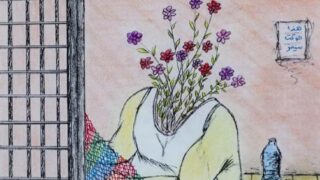“Women are jewels” is one of the most hackneyed clichés repeated by Islamists whenever they debate a feminist issue. This jargon is often brought up by moderate Islamists, particularly the Muslim Brothers, to defend their position vis-à-vis women rights and to justify practices such as imposing veil on women or their calls for gender segregation in public transportation. By describing women as jewels, they intend to say that women, like jewels, must be “hidden” in precious pockets for their own protection. A more deceptive way of putting it appears in the booklets that promote the ideology of the Muslim Brotherhood among women. Female readers are asked: “which of the two do you prefer, being a jewel or being a flower?”
The choice of the two objects tacitly reflects the different prices embodied by each of them: while the former is carefully watched over and locked up in a safe, the latter is showcased without any reservation whatsoever.
Such metaphors and sayings, however, are not limited to Islamists. In fact, some of the fiercest opponents of political Islam repeatedly and unashamedly come up with similar sayings. In the same context, we might be exposed to rhetorics that ostensibly protect women rights but their true essence does nothing but deprive women of their right to equality. They expose the tendency to treat women with “empathy” or “pity” due to their purported “beautiful vulnerability.”
English
The “Ideal mother” as a myth

Articles from Egypt
Repression and Expression: Creativity under the Egyptian Regime
“Smuggling drugs is easier than smuggling a poem or article out of prison.”
Old Habits Die Hard: Egyptian Police and the Enduring Legacy of Extrajudicial Execution
In a fateful moment overseen by family elders and tribal sheikhs, two young men (17 and 18 years old) decided to surrender themselves to Egyptian authorities in a bid to...
Ras El-Hekma: Has Egypt Sold its Land to the UAE?
In 2024, unidentified leaks brought to light Egypt's transaction involving the sale of Ras El-Hekma City to Emirati investors for $22 billion. This development occurred concurrently with the presence of...
From the same author
“Sharm el-Sheikh’s Economic Development Conference”
Egypt’s Development Conference in Sharm el-Sheikh ended on 15 March, 2015, sparking a debate among the Egyptian opposition. But it looked like a debate between malice and gloating on...
The sad story of a stumbling Revolution
“We stunned the world” has been a mantra almost ceaselessly propagated in Egyptian media ever since the January 25 Revolution succeeded in toppling Hosni Mubarak. The same phrase has been...





